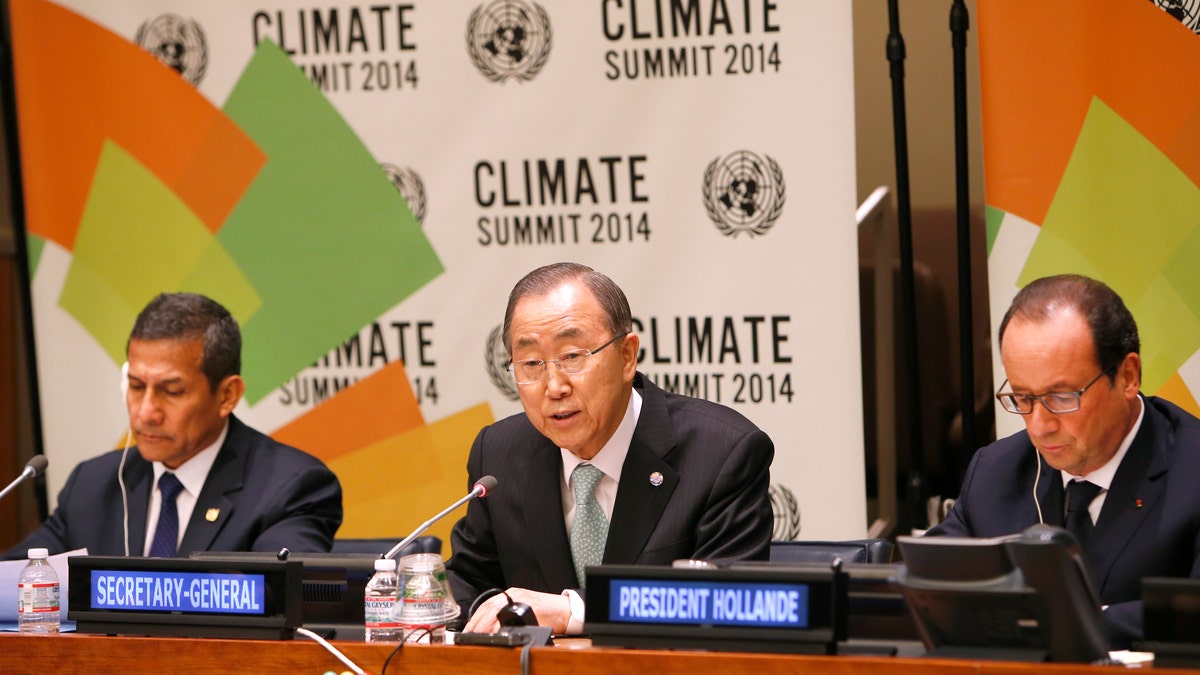
U.N. Secretary-General Ban Ki-moon, center, is joined by President Ollanta Humala of Peru, left, and President Francois Hollande of France at a news conference on climate change. (AP Photo/Jason DeCrow)
U.N. Secretary General Ban Ki-moon urged world leaders to throw their weight fully behind the effort to reduce greenhouse gas emissions on Tuesday, describing climate change as “the defining issue” of our time.
“To ride this storm we need all hands on deck,” he said, during the opening address of the U.N. Climate Summit in New York. “We have never faced such a challenge.”
More than 120 heads of state and government are attending the U.N. Climate Summit, which is seen as a key milestone on the path to a climate agreement in 2015.
“I am asking you to lead, we must cut emissions,” said Ban. “By the end of this century, we must be carbon neutral – we cannot emit more carbon than our planet can absorb.”
The U.N. chief also reiterated the goal of keeping global temperatures from rising more than 2 degrees C. above pre-industrial levels – a key target of the climate change movement. “Economists have shown that this comes at minimal extra cost, while the benefits to our planet are monumental,” he said.
The Climate Summit comes just two days after nearly 400,000 people took to the streets of Manhattan in the largest climate march in history.
New York Mayor Bill de Blasio also addressed the Climate Summit on Tuesday morning, describing climate change as “an existential threat” to humanity.
“This is an issue we all face – no-one is spared,” he said. “For New York this is particularly urgent – two years ago Hurricane Sandy left 44 people dead in our city.”
Keen to put New York at the forefront of the climate change agenda, de Blasio explained that the city’s greenhouse gas emissions are down 19 percent from 2005, thanks to a plan instituted by his predecessor, Michael Bloomberg.
New York, he added, is fully committed to an 80 percent reduction in greenhouse gas emissions by 2050.
On Monday Secretary of State John Kerry and Apple CEO Tim Cook delivered a rallying cry for cutting carbon emissions.
However, skeptics have questioned the effort to cut carbon emissions and reshape the world economy, citing, in particular, its impact on growth.
“Any time world leaders are gathering, their number one focus needs to be what will promote human progress,” Alex Epstein, founder of the Center for Industrial Progress, told FoxNews.com. “The whole focus of this so-called ‘climate summit’ is to only look at the alleged negatives of using fossils fuels – it’s like an antibiotics summit where you only look at the negative effects of antibiotics.”
Epstein, author of the forthcoming book The Moral Case for Fossil Fuels, also highlighted the inherent volatility of the global climate. “Nature doesn’t give us a safe climate that we make dangerous," he said. "It gives us a dangerous climate that we make safe, above all, by using energy from fossil fuels.'
Citing data from the EM-DAT International Disaster Database, Epstein explained that climate-related deaths have actually declined 98 percent over the last 80 years.
“My conclusion is that, if we look at the big picture, not only are the economic benefits [of fossil fuels] overwhelmingly positive, but the environmental benefits are overwhelmingly positive,” he said.
The U.N. has suffered a number of blows in its push for a climate agreement. Australia’s new government, for example, recently repealed its two-year old national carbon tax, and countries such as Canada, Russia, and Japan have refused to sign on for an extension to the Kyoto Protocol to combat greenhouse gases.
On Monday a study reported that rising temperatures in the Pacific Ocean off the coast of North America over the past century followed natural changes in the wind, as opposed to increases in greenhouse gas emissions.
Follow James Rogers on Twitter @jamesjrogers
